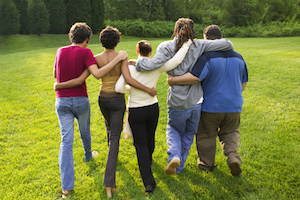How the Science of Happiness Can Help You Connect with Others
After taking our free online course, many students see big changes in their relationships.
Judy is a breast-cancer survivor. When she found out that a woman in her yoga class was undergoing chemotherapy, she reached out to introduce herself.
Her timing couldn’t have been better: The woman was scheduled for a mastectomy two days later. “I told her I would be available to her any time day or night,” said Judy, who has been texting with the woman ever since. “I feel I’ve been able to provide a shoulder for her. She’s no longer a stranger.”

We know Judy’s story because she is a student in our Science of Happiness course, a free, eight-week online course that explores the roots of a happy, meaningful life. When we asked recent students how the course had impacted them, they shared everything from little habit changes to big life transitions, like quitting smoking or finding a new job. But one of the themes that kept coming up was how the course—which emphasizes how important relationships are for happiness—enhanced their sense of connection to others.
“I’ve started making a conscious effort to connect with people daily—even if it is just smiling and saying hello to a stranger in a grocery store (which can be a stretch for an introvert like me!),” said another student named Kathryn. Driving home one day, she stopped to offer a ride to a woman who seemed to be in pain as she walked slowly down the street. It turned out the woman was disabled and on her way to the grocery store, so Kathryn drove her there and back.
“We had a wonderful talk and she was so grateful. That made ME feel wonderful as well,” Kathryn recalled.
Amy, a student who started volunteering as a “listener” for the free counseling service 7 Cups, also felt that practicing kindness toward others enhanced her own life. “It seems the more I put out (talking to strangers, complimenting, smiling, etc.), the more I get back in life,” she said.
For difficult interactions, Bruna found that meditating and writing down her negative feelings helped change her attitude. “I think people do the best that they can with what they got, so I don’t blame others anymore,” she said.
Students also talked about strengthening their current relationships with friends, family, and romantic partners. Suzette, for example, was inspired by the course to do something new or visit a new place every month—and to invite casual acquaintances to join her, building their friendship.
Katie started doing the Three Good Things practice, where you note positive things that happened during the day as a way to enhance gratitude and bring attention to the blessings in life. Her partner joined in for this pre-bedtime ritual.
“I’ve noticed feeling more rested when we do this,” she said. “We laugh more before we sleep and are spending less time looking at screens.”
Do you want to deepen your social connections and explore the roots of your own happiness? On September 5, we will launch the seventh installment of The Science of Happiness. Sign up for the course and join our community of like-minded students hoping to live happier and more connected lives.